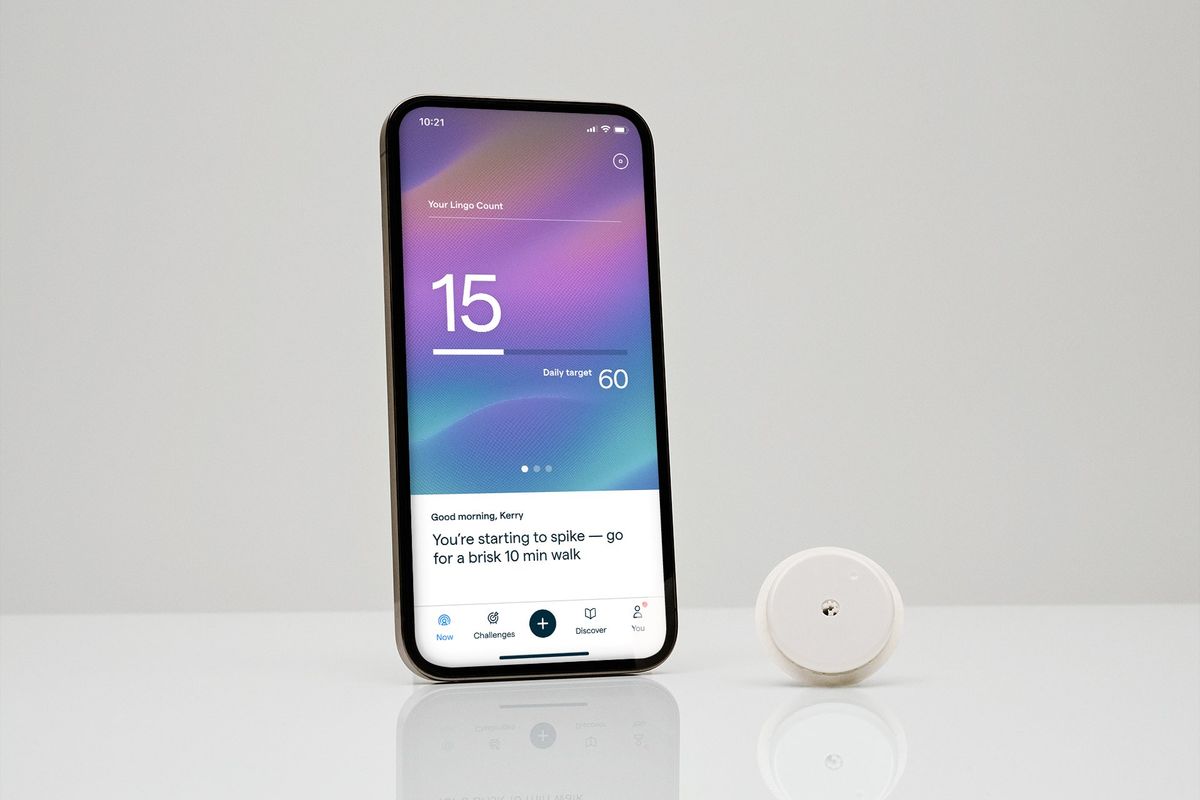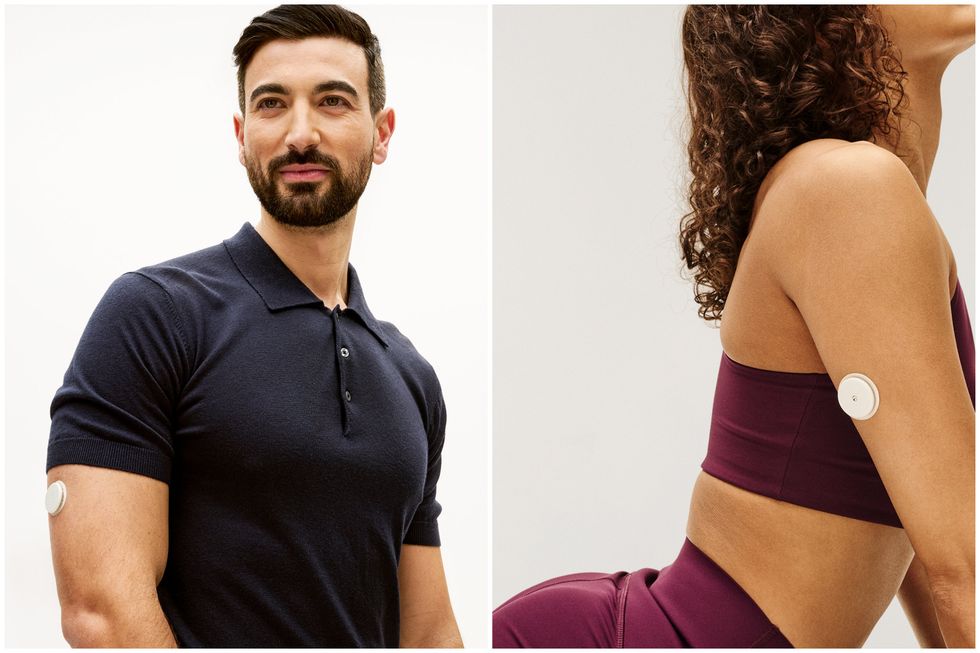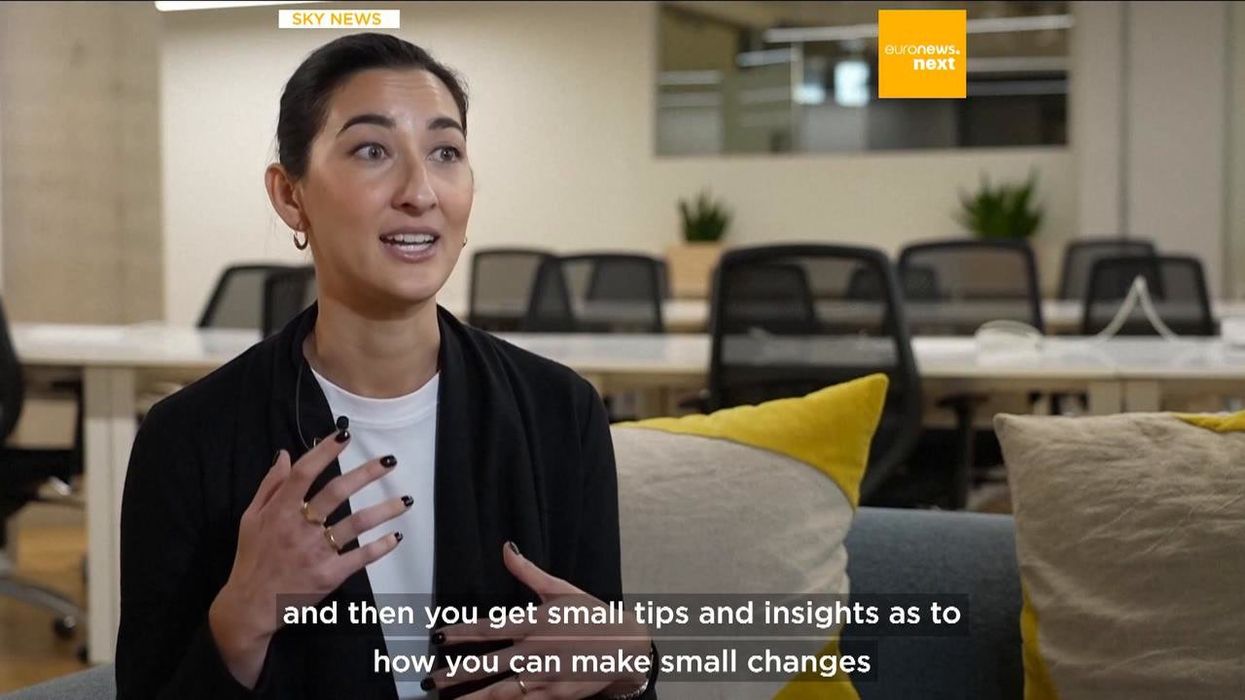Science & Tech
Harriet Brewis
Mar 28, 2024
This arm patch can help non-diabetics track blood sugar in real-time using …
Euronews Business / VideoElephant
It’s hard to keep track of all the ways in which you’re supposed to care for your body.
How many steps have you done today? Have you taken a moment to be mindful? And have you eaten your '30 plants' this week?
Many of us use smart watches or other wearable devices to check our progress in these various fields, with some bossily pushing us to “get moving” or painfully reminding us that we “failed to meet” our sleep goals.
But new technologies are emerging that literally get under your skin, and can tell you how your body is responding in real time to every snack you eat, every drink you sip and every hour you spend stuck at a desk.
One such gadget is the Lingo biosensor, from Global Healthcare company Abbott, which brands itself as “your personal metabolic coach”.
The sensor works by being painlessly injected into the back of the arm (you basically punch it in like a stamp) and then using a small filament to measure your blood glucose levels throughout the day and night.
Of course, there is an app that goes with it – a slick, muted-toned showcase of “challenges” and handy facts to “help you manage your glucose and live a healthy lifestyle”.
There’s even a welcoming video message, declaring that Lingo’s “personalised coaching plan” will “help you lift your mood, improve your sleep, boost your energy, increase your focus and manage your hunger”.
It also introduces the concept of a “Lingo count” – essentially a system by which you accrue points based on your blood glucose spikes.
Generally, the more spikes you register, the higher your Lingo count – although exercise and other activities can help reduce this number.

The app’s most prominent feature is a graph, which records and displays your glucose levels over a period of six-to-24 hours.
It shows when your spikes and dips occur, and encourages you to log what may have caused them.
This may all sound a bit intense and invasive but the brains behind Lingo insist that the aim is quite the opposite.
“There’s a huge challenge across a number of countries, especially in the UK, around supporting people with preventative health,” Sarah Tan, Europe general manager of Abbott’s Lingo business, told indy100.
“And yet, there’s been a big movement around people wanting to take more ownership of their health choices.”
Sarah noted that the technology behind the sensor – also known as a continuous glucose monitor (CGM) – has been used by diabetics for decades but it hasn’t been marketed to the general public until now.
“We could see there was interest from people outside of the diabetes community to engage with this technology,” Sarah explained.
“And there are research papers that really demonstrate the health benefits of managing your glucose levels as somebody who doesn't have diabetes.
“So we said, OK, how can we leverage the technology and the science while understanding the needs of somebody who doesn't have diabetes are very different to somebody who needs the sensor to make minute-by-minute, day-by-day decisions about their blood sugar levels?
“And so this is really how Lingo really came about: it’s been completely developed from scratch for somebody who doesn't need to use it for diabetes management – it's much more holistic.”
What are the benefits of managing blood glucose?
To put it simply, the benefits are huge and wide-ranging.
They include improved weight management, focus and concentration, hormonal regulation, cardiovascular health, and mood, to name but a few.
So how does the Lingo ultimately differ from other glucose monitoring systems?
According to Sarah, the Lingo is geared towards “offering people information that’s useful within the preventative health space, rather than the treatment space, as in diabetes care”.
Explaining the novel concept of the “Lingo count,” she said: “The key message we’re trying to get across to people – and again, this is very different to when you use an app that's built for managing diabetes – is that not all spikes are bad and you have a natural level of fluctuation.
“The whole point of managing your glucose levels as somebody without diabetes is you're not aiming to eliminate all variability in your glucose levels; rather, you’re trying to minimise the ones that are harmful to you.
“If, over time, you continue to have that repeated level of glucose volatility, that's what leads to you potentially developing metabolic disorder – things like type two diabetes.”
She said the idea with the programme is to help people understand how their body responds to different elements of daily life, whether that’s food, stress or exercise.
“The idea is that you start to link your Lingo count responses to the activities you're doing,” she said.
“So, obviously, things you’re eating but also noting when you’re stressed. Stress has a huge impact on my Lingo count, for example.”
She continued: “It's also interesting to bring movement into the mix because movement tends to spike your glucose, but obviously this is a positive spike.”

How do you stop people from forming unhealthy obsessions?
“We want this to be a positive experience – it's about being holistic and not just focusing on spiking when you eat,” Sarah said.
“We’ve also built in lots of guardrails and tried to ensure that the recommendations presented to users are very much not restrictive.
“You'll see in the app the tips are less about ‘don't eat this’ and more about ‘what if you do this instead?’"
She pointed out that when you sign up for the programme, you’re presented with a pop-up that asks if you’ve had a history of disordered eating, in which case, you should consider whether the technology might be triggering for you and speak with a health professional before moving ahead.
“We've aimed to be responsible and sensible and put safeguards in place but, at the end of the day, we accept that the technology might not be appropriate for everyone.”
Lily Soutter, a nutritionist in Abbott’s Lingo business, agreed, emphasising: “We’re not looking at restriction, we’re looking at building healthier habits.
“And it's not all about graphs and spikes, it’s about education. The app contains all these resources to help people interpret their glucose data so that they're not panicking when they see a sudden spike with a particular food or a particular type of exercise.”
Summing it all up, she concluded: “The concept really isn't trying to increase in anxiety in people, it's about helping them to lead healthier lives.”
And when tech looks and feels as slick as this, without being overly intrusive, the future of healthy living certainly seems that little bit brighter.
Sign up for our free Indy100 weekly newsletter
Have your say in our news democracy. Click the upvote icon at the top of the page to help raise this article through the indy100 rankings
Top 100
The Conversation (0)














